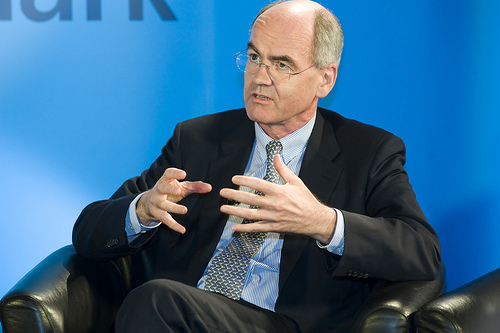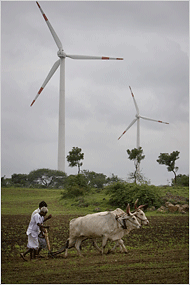 In Athens on June 11, 2010, Dr. Wayne Visser, Director of CSR International, interviewed John Elkington, Founder and Non-Executive Director of SustainAbility and Founding Partner and Director of Volans Ventures. During the interview, Elkington spoke about where he sees the sustainability and social enterprise agenda heading. I found a couple of his remarks interesting.
In Athens on June 11, 2010, Dr. Wayne Visser, Director of CSR International, interviewed John Elkington, Founder and Non-Executive Director of SustainAbility and Founding Partner and Director of Volans Ventures. During the interview, Elkington spoke about where he sees the sustainability and social enterprise agenda heading. I found a couple of his remarks interesting.
In the field of CSR and sustainability, we struggle with the question of how to change peoples’ behavior day to day. Elkington suggested that “you only get behavioral change that’s consistent and sticks if you get cultural change”. So now the big question is how do we inspired cultural change?
Another interesting or rather provocative statement was Elkington’s take on sustainability and the economy…
“I feel that sustainability is going to be impossible unless we have a really major economic meltdown. And I’ve been feeling that we were headed toward some element of that for some years. I don’t think as yet we have had enough of that crisis to really force a re-think.”
Wow! What do you think? Do you agree with John Elkington’s assessment?
Watch the entire interview below:
<!–a135a6eb1af14c85bc2e0aa4cc276d8e–>
Follow Cindy on Twitter @ethicalbiz
Image credit: Bjornve via Flickr



He may not be correct, unfortunately. One would think that economics and social upheaval would engage us in sustainability, but we have been down this road before with little impact or staying power.
The 1973 Arab Oil Embargo should have sparked the U.S. into action to pursue an economy with reduced oil consumption 37 years ago, but that of course did not happen. While that event was my epiphany, it did not catch the attention of the country as a whole. The price of oil in the U.S. still doesn’t reflect all of the costs of producing or the costs of the associated externalities, so the financial driver is not there. Since 1973 U.S. energy consumption has quintupled and our oil imports have more than doubled to 65% of total consumption. Several other countries, like Brazil, France, and Sweden, reacted strongly to the oil embargo and are in much better shape as a result.
So what does it take to spark people into action? Drs. Edward Sadala and Susan Ledlow at Arizona State University feels that short-term perspective, status seeking behavior, tribalism, and innumeracy are key obstacles to the adoption of more sustainable behavior. The deeply-engrained human tendencies tend to keep humans from engaging in serious issues like sustainability.
It is common for us to think that the next major social/economic/environmental calamity will move us significantly, but unfortunately, repeated events have failed to produce lasting results. I can understand the thought process that makes many think that it will be a major economic meltdown to get us going, but again, I think that assumes too much.
He may not be correct, unfortunately. One would think that economics and social upheaval would engage us in sustainability, but we have been down this road before with little impact or staying power.
The 1973 Arab Oil Embargo should have sparked the U.S. into action to pursue an economy with reduced oil consumption 37 years ago, but that of course did not happen. While that event was my epiphany, it did not catch the attention of the country as a whole. The price of oil in the U.S. still doesn’t reflect all of the costs of producing or the costs of the associated externalities, so the financial driver is not there. Since 1973 U.S. energy consumption has quintupled and our oil imports have more than doubled to 65% of total consumption. Several other countries, like Brazil, France, and Sweden, reacted strongly to the oil embargo and are in much better shape as a result.
So what does it take to spark people into action? Drs. Edward Sadala and Susan Ledlow at Arizona State University feels that short-term perspective, status seeking behavior, tribalism, and innumeracy are key obstacles to the adoption of more sustainable behavior. The deeply-engrained human tendencies tend to keep humans from engaging in serious issues like sustainability.
It is common for us to think that the next major social/economic/environmental calamity will move us significantly, but unfortunately, repeated events have failed to produce lasting results. I can understand the thought process that makes many think that it will be a major economic meltdown to get us going, but again, I think that assumes too much.